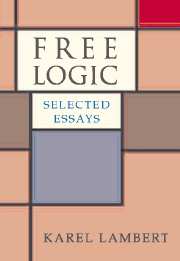Book contents
- Frontmatter
- Contents
- Introduction
- 1 Russell's Version of the Theory of Definite Descriptions
- 2 Existential Import, ‘E!’ and ‘The’
- 3 The Reduction of Two Paradoxes and the Significance Thereof
- 4 The Hilbert-Bernays Theory of Definite Descriptions
- 5 Foundations of the Hierarchy of Positive Free Definite Description Theories
- 6 Predication and Extensionality
- 7 Nonextensionality
- 8 The Philosophical Foundations of Free Logic
- 9 Logical Truth and Microphysics
8 - The Philosophical Foundations of Free Logic
Published online by Cambridge University Press: 05 June 2012
- Frontmatter
- Contents
- Introduction
- 1 Russell's Version of the Theory of Definite Descriptions
- 2 Existential Import, ‘E!’ and ‘The’
- 3 The Reduction of Two Paradoxes and the Significance Thereof
- 4 The Hilbert-Bernays Theory of Definite Descriptions
- 5 Foundations of the Hierarchy of Positive Free Definite Description Theories
- 6 Predication and Extensionality
- 7 Nonextensionality
- 8 The Philosophical Foundations of Free Logic
- 9 Logical Truth and Microphysics
Summary
WHAT FREE LOGIC IS AND WHAT IT ISN'T
On page 149 of the second edition of their book, Deductive Logic, Hugues Leblanc and William Wisdom say the following about the origins of free logic.
Presupposition-free logic (known for short as free logic) grew out of two papers published simultaneously: Hintikka's ‘Existential Presuppositions and Existential Commitments’, The Journal of Philosophy. Vol. 56. 1959. pp. 125–137, and Leblanc and (Theodore) Hailperin's ‘Nondesignating Singular Terms’. The Philosophical Review. Vol. 68, 1959. pp. 129–136. Both made use of the identity sign ‘=’. In a later paper Karel Lambert devised a free logic without ‘=’ … (See Lambert's ‘Existential Import Revisited’, Notre Dame Journal of Formal Logic, vol. 4, (1963), pp. 288–292).
This account is in one respect misleading, and in another inaccurate. It is misleading because Rolf Schock, independently either of Hintikka or of Leblanc and Hailperin, was developing a version of free logic in the early 1960s quite different in character from those mentioned by Leblanc and Wisdom. Moreover Schock's ideas were in certain respects more fully developed because he also supplied models for his own systematization. The writers mentioned by Leblanc and Wisdom had suggested – in print at any rate – only informally the semantical bases for their formulations. (Apparently Schock's ideas were known to some European scholars in the early 1960s but oddly were not disseminated. One can find an account of Schock's pioneering efforts in his 1968 book, Logics Without Existence Assumptions.
- Type
- Chapter
- Information
- Free LogicSelected Essays, pp. 122 - 175Publisher: Cambridge University PressPrint publication year: 2002



